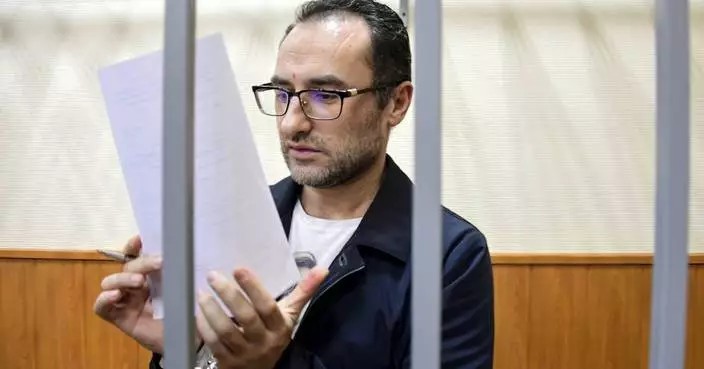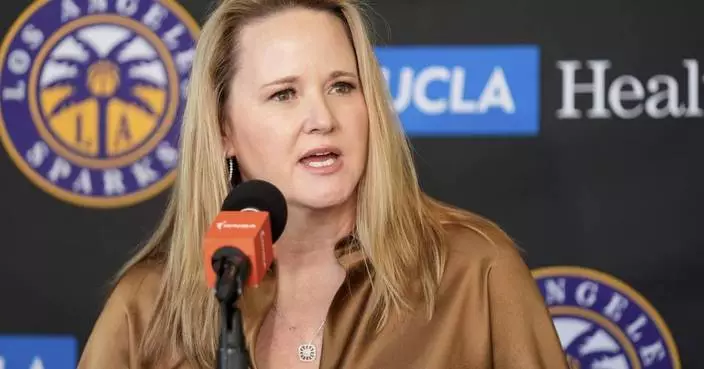NEW YORK (AP) — A triptych of criminal charges paints a searing, sometimes disparate portrait of the man accused of ambushing and killing UnitedHealthcare’s CEO Brian Thompson as the executive arrived at a Manhattan hotel for his company’s annual investor conference.
Filed separately in state courts in New York and Pennsylvania, and a federal court in Manhattan, and totaling 20 counts, the charges brand Luigi Mangione as both a terrorist and a stalker, accuse him of carrying a ghost gun and a fake ID, and enable prosecutors to seek life in state prison and the federal death penalty.
Click to Gallery
Luigi Mangione appears in Manhattan Criminal court for his arraignment on state murder and terror charges in the killing of UnitedHealthcare CEO Brian Thompson, Monday, Dec. 23, 2024, in New York. (Curtis Means/Pool Photo via AP)
Luigi Mangione appears in Manhattan Criminal court for his arraignment on state murder and terror charges in the killing of UnitedHealthcare CEO Brian Thompson, Monday, Dec. 23, 2024, in New York. (Curtis Means/Pool Photo via AP)
Luigi Mangione appears in Manhattan Criminal court for his arraignment on state murder and terror charges in the killing of UnitedHealthcare CEO Brian Thompson, Monday, Dec. 23, 2024, in New York. (Curtis Means/Pool Photo via AP)
Luigi Mangione appears in Manhattan Criminal court for his arraignment on state murder and terror charges in the killing of UnitedHealthcare CEO Brian Thompson, Monday, Dec. 23, 2024, in New York. (Curtis Means/Pool Photo via AP)
Luigi Mangione appears in Manhattan Criminal court for his arraignment on state murder and terror charges in the killing of UnitedHealthcare CEO Brian Thompson, Monday, Dec. 23, 2024, in New York. (Curtis Means/Pool Photo via AP)
On Monday, in the last of three court appearances in five days, the 26-year-old Ivy League graduate pleaded not guilty in New York state court to an indictment charging him with 11 counts in connection with the Dec. 4 killing, including murder as a crime of terrorism.
Mangione’s state court arraignment followed back-to-back hearings last Thursday in Pennsylvania, where he was arrested Dec. 9, and in federal court in Manhattan, where a judge ordered him jailed without bail on murder, gun and stalking charges.
Mangione’s lawyer, Karen Friedman Agnifilo, has argued that the terrorism allegations in the state case and stalking charges in the federal complaint appear to be at odds. Prosecutors are treating him "like a human ping-pong ball and "some sort of spectacle,” she said in court Monday.
Here's a look at the cases and the charges involved:
Mangione’s state court indictment alleges he killed Thompson to "intimidate or coerce" a group of people and influence government policy “by intimidation or coercion.”
It includes three counts of murder, alleging Mangione killed “in furtherance of terrorism,” as an act of terrorism and with intent, and carries a maximum sentence of life in prison.
Manhattan District Attorney Alvin Bragg, whose office is prosecuting the case, said last week that the midtown Manhattan ambush “was a killing that was intended to evoke terror.”
The indictment also charges Mangione with seven gun-related counts and one count related to a fake New Jersey driver’s license that prosecutors said he used to check into a Manhattan hostel when he arrived in the city 10 days before the killing.
Prosecutors say they anticipate the state case will be the first to go to trial.
After his arraignment Monday, Mangione was returned to a federal jail in Brooklyn while state and federal authorities sort out where he'll be detained while the state case plays out.
A day after Bragg announced Mangione’s state indictment, federal prosecutors upped the ante with a four-count criminal complaint that could bring the death penalty if he is convicted.
The complaint charges two counts of stalking and one count each of murder through use of a firearm, and a firearms offense. Murder through use of a firearm carries the possibility of the death penalty, though prosecutors have not said if they will seek it.
Mangione made an initial appearance on the charges before a federal magistrate judge last Thursday but was not required to enter a plea. The U.S. attorney's office in Manhattan has until mid-January to secure an indictment from a federal grand jury.
According to the federal complaint, Mangione had a spiral notebook in which he expressed hostility toward the health insurance industry and wealthy executives. UnitedHealthcare is the largest health insurer in the U.S., though the company said Mangione was never a client.
Among the entries, the complaint said, was one from August that said “the target is insurance” because “it checks every box” and one from October that describes an intent to “wack” an insurance company CEO.
Mangione was arrested on Dec. 9 in Altoona, Pennsylvania, about 230 miles (about 370 kilometers) west of New York City, and initially charged there with possession of an unlicensed firearm, forgery and providing false identification to police.
Blair County Peter Weeks said last week that he intends to keep the case active and plans to revisit it once Mangione’s murder charges are adjudicated.
Mangione was arrested while eating breakfast at an Altoona McDonald’s after a customer noticed that he looked like the person in surveillance photos that police were circulating of Thompson’s killer.
Officers found a gun that matched the one used in the shooting, a fake ID and writings that expressed hostility toward the health insurance industry, prosecutors said.
Hours later, the Manhattan DA’s office filed paperwork for a warrant for Mangione’s arrest on a murder charge. Mangione, who was held without bail in Pennsylvania, headed off a protracted extradition fight by agreeing to be flown to New York last Thursday.

Luigi Mangione appears in Manhattan Criminal court for his arraignment on state murder and terror charges in the killing of UnitedHealthcare CEO Brian Thompson, Monday, Dec. 23, 2024, in New York. (Curtis Means/Pool Photo via AP)
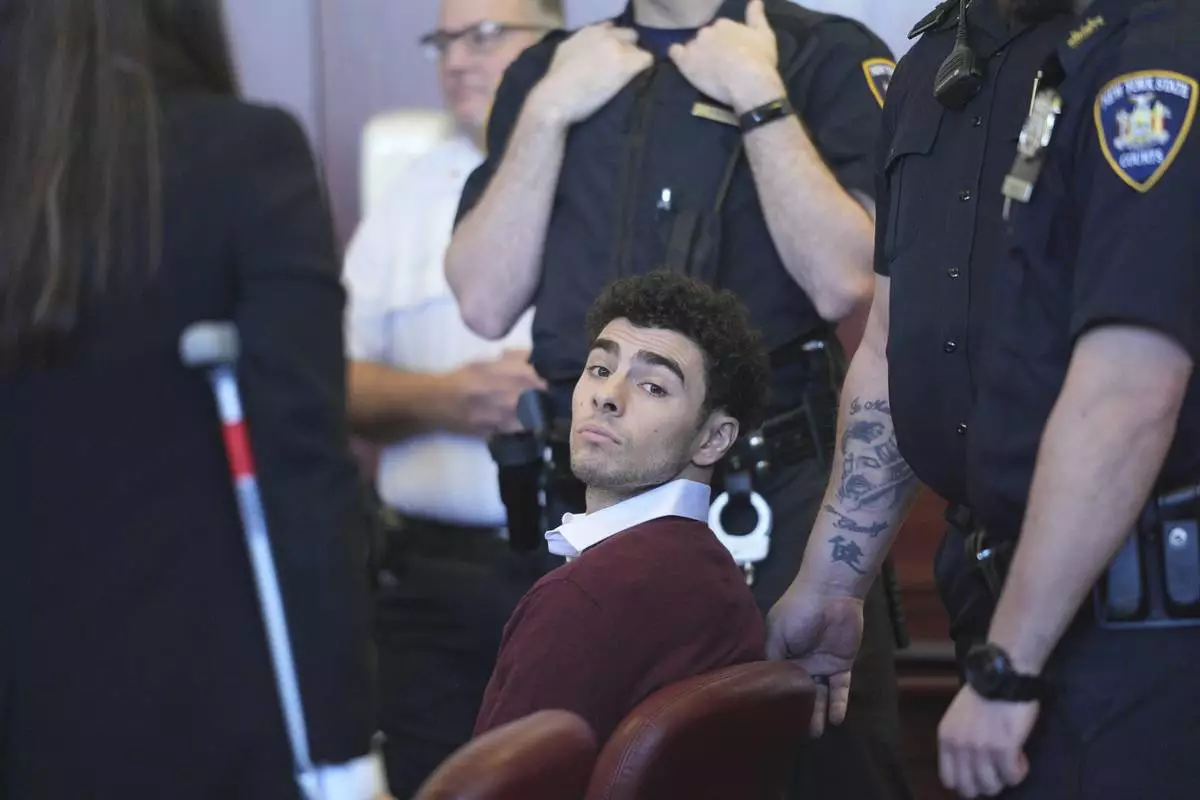
Luigi Mangione appears in Manhattan Criminal court for his arraignment on state murder and terror charges in the killing of UnitedHealthcare CEO Brian Thompson, Monday, Dec. 23, 2024, in New York. (Curtis Means/Pool Photo via AP)

Luigi Mangione appears in Manhattan Criminal court for his arraignment on state murder and terror charges in the killing of UnitedHealthcare CEO Brian Thompson, Monday, Dec. 23, 2024, in New York. (Curtis Means/Pool Photo via AP)
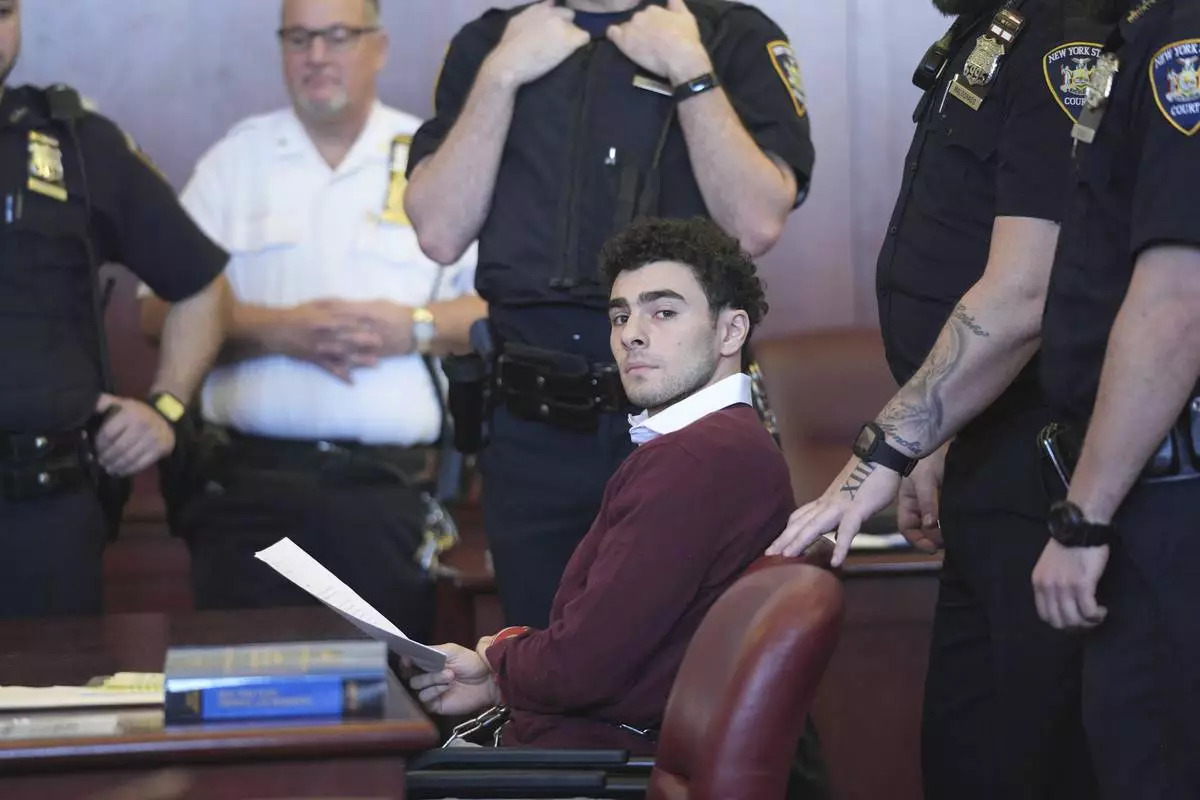
Luigi Mangione appears in Manhattan Criminal court for his arraignment on state murder and terror charges in the killing of UnitedHealthcare CEO Brian Thompson, Monday, Dec. 23, 2024, in New York. (Curtis Means/Pool Photo via AP)

Luigi Mangione appears in Manhattan Criminal court for his arraignment on state murder and terror charges in the killing of UnitedHealthcare CEO Brian Thompson, Monday, Dec. 23, 2024, in New York. (Curtis Means/Pool Photo via AP)
RALEIGH, N.C. (AP) — North Carolina Gov. Roy Cooper is leaving his job after eight years in which the southern Democrat picked his moments against a Republican-dominated legislature, winning big on Medicaid expansion and clean energy while falling short in fights over private-school vouchers and abortion rights.
Cooper, who steered the state through the coronavirus pandemic, Hurricanes Helene and Florence and an early flashpoint in the culture wars over access to public restrooms, was barred from seeking a third consecutive term. He is wrapping up 24 consecutive years in statewide office — the first 16 as attorney general.
In a December interview with The Associated Press at the executive mansion, Cooper reflected on his gubernatorial terms with an emphasis on the positive — an easier undertaking compared with many Democrats around the country in the aftermath of this year's election.
"To be able to wake up every morning and get to lead the state that you love has been humbling, challenging and fulfilling. I have really valued every day,” said Cooper, who will be succeeded by state Attorney General Josh Stein, a fellow Democrat, in early January.
Faced with veto-proof majorities for almost half of his time as governor, Cooper was unable to stop many GOP initiatives, including deep income tax cuts, taxpayer-funded vouchers to help public school students attend private schools and new restrictions on abortion.
But Cooper, one of several Democratic governors seen as potential contenders for federal office, managed last year to persuade GOP legislative leaders to expand Medicaid under the Affordable Care Act — something he had sought since getting sworn in as governor in 2017. Now 600,000 low-income adults are enrolled in the program a year ahead of expectations.
“This is a generational investment in people’s health,” Cooper said during a farewell address last week in Nash County, where he grew up and launched his first gubernatorial campaign in 2015. Another bipartisan agreement was reached in 2021 on a milestone energy bill that ordered sharp reductions in greenhouse gas emissions from power plants.
Cooper takes credit for conditions that led to big corporate expansions that he says have contributed to hundreds of thousands of new jobs being created during the past eight years, including those in the clean energy sector. But he also gives his rare praise to Republican lawmakers for all working together on offering economic incentives that have lured companies such as Apple, Toyota and Boom Supersonic to build in the state.
Still, Republicans contend Cooper receives too much acclaim for the state’s broad economic success and has pushed for reckless state spending at every turn. Most of his record 100-plus vetoes were overridden.
“There has not been a governor who has had less of his agenda enacted and North Carolina has succeeded in spite of his leadership failures," state GOP spokesperson Matt Mercer said.
Regardless, Cooper’s perceived accomplishments in a swing state raised his national profile during this year’s presidential campaign, making him as a potential running mate for Kamala Harris until he said it "just wasn’t the right time" for him and for North Carolina. Now Cooper, 67, will have to decide whether trying to unseat U.S. Sen. Thom Tillis, a Republican, in 2026 is in the cards after holding what he calls the “best job I have ever had.”
While North Carolina Democrats have won eight of past nine gubernatorial elections, they haven’t won a U.S. Senate race since 2008.
“If you’re going to run for public office again, you must have your heart and soul in it, you must have the fire in the belly,” Cooper told the AP.
With that in mind, he said he planned to take a couple of months to clear his head before deciding what’s next: “I’m going to think about how I can best contribute to the things that I care about.”
It’s little wonder why many North Carolina Democrats want Cooper to remain on the political stage. He has never lost a race for state office, from the legislature in the mid-1980s and including a 10,000-vote win over then-GOP Gov. Pat McCrory in 2016.
“What he’s done really from my perspective is he’s kept the progressive flame alive in North Carolina in a difficult time,” said Gary Pearce, a longtime Democratic political consultant who worked with four-term Gov. Jim Hunt. “I’m not sure anybody else could have done it as well as he did.”
Cooper took on Republicans even before he was sworn in.
As governor-elect he began a series of lawsuits challenging legislation approved weeks before he took office that shifted executive branch powers to the legislature. The legal results were mixed, and even now litigation over his appointment powers remains in court. This month, Republican lawmakers enacted more changes that would weaken Stein's gubernatorial authority. A lawsuit has been filed.
In his first three months in office, Cooper worked with lawmakers to partially repeal the 2016 “bathroom bill,” which had required transgender people to use public bathrooms aligned with the gender on their birth certificate. The law had lost the state business, including canceled sporting events and job expansions, and “North Carolina’s reputation was in tatters,” Cooper said.
Eight years later, “we built a North Carolina that is healthier, better educated, with more money in people’s pockets, and we stand ready to welcome prosperity with open arms for generations to come,” Cooper said.
Republicans cite several shortcomings in Cooper's administration. They include spending overruns at the state Department of Transportation; continued delays to rebuild or renovate homes for eastern North Carolina residents after Hurricanes Matthew in 2016 and Florence in 2018; and executive orders that helped extend restrictions on businesses and school instruction during the COVID-19 pandemic.
“It’s been painful dealing with the governor fiscally,” Republican state Sen. Warren Daniel said. “I just think he’s not very good at managing government.”
Cooper has defended his actions, particularly his pandemic leadership, saying North Carolina came out better than many other states.
Even in policy defeats, Cooper secured the admiration of supporters. The Democratic governor used lots of political capital in 2023 trying unsuccessfully to block a law that changed the state’s ban on most abortions from after 20 weeks of pregnancy to 12 weeks. Republicans overrode his veto.
“There’s simply no governor who’s ever fought as hard or as publicly as Gov. Cooper has to protect access to abortion,” said Paige Johnson with Planned Parenthood South Atlantic.
Plenty of North Carolinians see that differently. Cooper’s opposition to the abortion bill reflects an administration that “has been consistently hostile to policies that serve the best interests of North Carolina families,” said Tami Fitzgerald, executive director of the NC Values Coalition.
Cooper said he has confidence that Stein, who succeeded him as attorney general, will “continue a lot of the progress that we have made.” Cooper hired Stein two decades ago, while attorney general, to be his consumer protection chief.
Otherwise, Cooper knows that he’ll miss “having the opportunity every single day to do something to make a real difference.”
“That’s what you can do in this job,” he added. "And whatever I decide to do, that’s going to be hard to replicate."
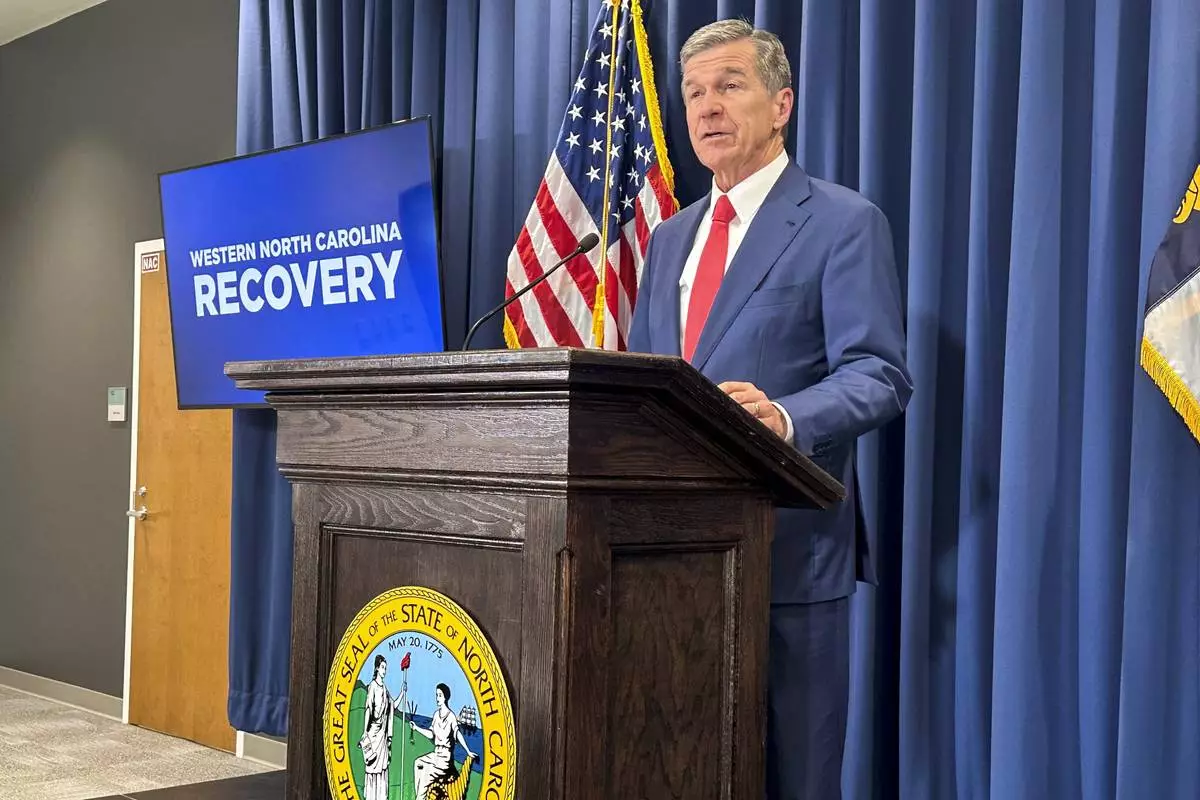
FILE - North Carolina Gov. Roy Cooper unveils a report during a press conference in Raleigh, N.C., Oct. 23, 2024. (AP Photo/Gary D. Robertson, File)

FILE - North Carolina Gov. Roy Cooper, center left, watches a robotics team at Nashville Elementary School in Nashville, N.C., direct its vehicle in the school library, Tuesday, Jan. 23, 2024. (AP Photo/Gary D. Robertson, File)
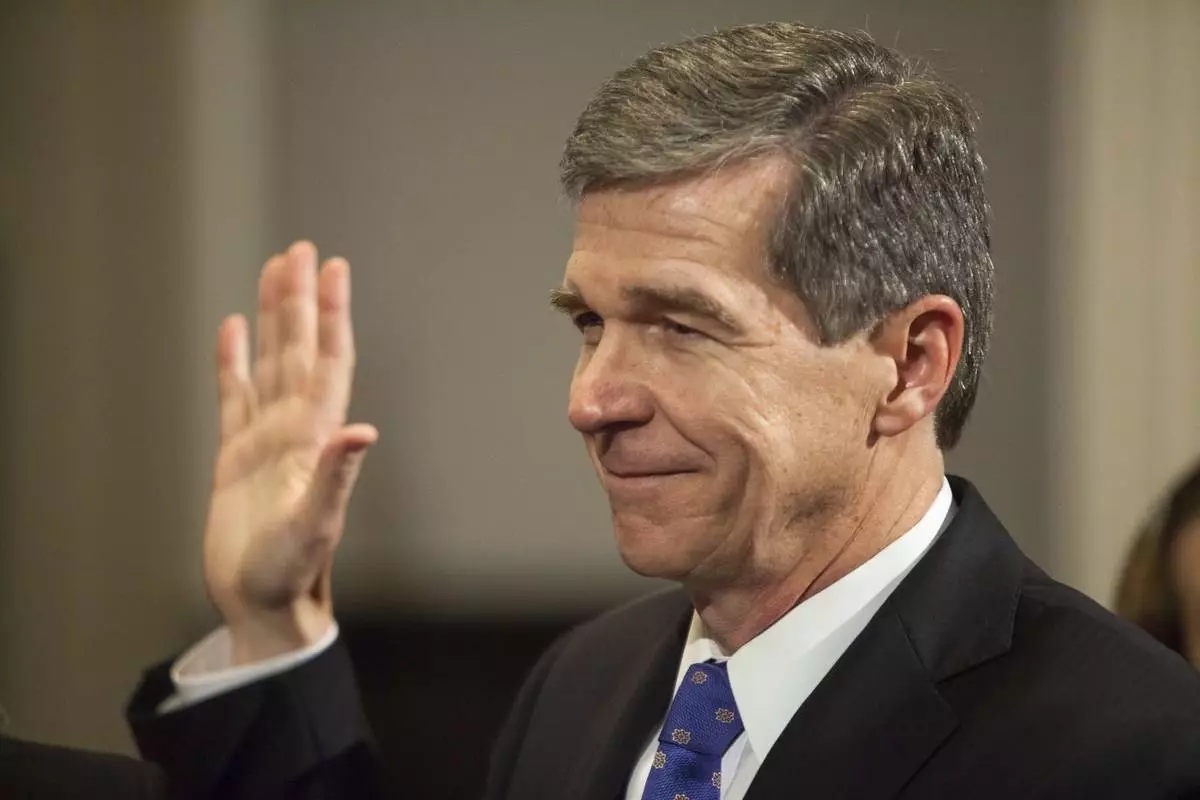
FILE - Roy Cooper is sworn in as North Carolina governor shortly after midnight at the historic state Capitol Building in Raleigh, N.C., early Sunday, Jan. 1, 2017. (AP Photo/Ben McKeown, Pool, File)

FILE - North Carolina Gov. Roy Cooper arrives to speak at a campaign event in Charlotte, N.C., Sept. 12, 2024. (AP Photo/Nell Redmond, File)




















